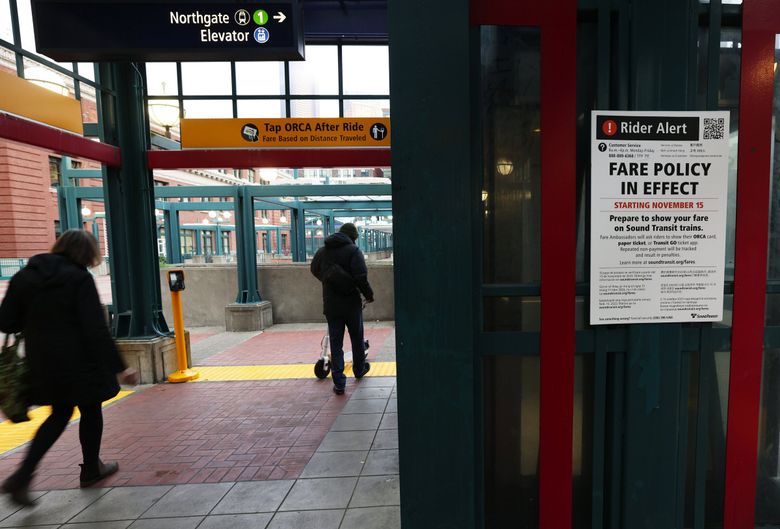
After a 3 1/2-year hiatus, Sound Transit will restart fare enforcement Wednesday and soon begin issuing fines to passengers repeatedly found to ride light rail or Sounder without paying.
Though regular riders likely have seen the agency’s “fare ambassadors” inspecting ORCA cards and paper tickets, Sound Transit has stopped short of sending citations as it rolls out a new tiered warning system and adds staff to check fares.
Now, those who cannot show proof they paid during their ride run the risk of an escalating fine. Passengers will receive two warnings before facing financial penalties. The third time someone is caught not paying will result in a $50 fine, a $75 fine for the fourth, and finally a $124 civil infraction. The civil infraction could result in a misdemeanor if unpaid.
But as Sound Transit aims to enforce payment, the odds of any passenger being checked three times are miniscule. Sound Transit employs fewer than 50 fare ambassadors to roam its buses and trains, and they have checked just 1.16% of passengers over the last six months — a stretch when there has been no penalty for non-payment.
Around 120,000 people use Sound Transit each weekday. Sound Transit’s longer term goal is to hire 125 ambassadors.
If a transit user does receive a citation, they have a few options other than paying. They can load the citation amount onto an ORCA card, sign up for a focus group, enroll in a fare violation resolution course, sign up for a subsidized ORCA card or sign a pledge committing to pay in the future and go a year without another infraction. Riders who believe they’ve been wrongly cited can also file an appeal with the agency.
Sound Transit’s more challenging problem is tracking each passenger’s warnings. In issuing a warning, a fare ambassador will ask a rider for an ID or name but won’t have the means to verify it.The agency has considered photographing people who refuse to show their ID, but has shelved that idea for now. Passengers found to give false information may be asked to leave the train.
Fare collection stopped early in the pandemic amid concerns about face-to-face contact. It’s been slow to return as board members have sought a new process that’s less reliant on the court system and with a friendlier face. Data showed Black passengers receiving a disproportionate share of citations and misdemeanors.
The ambassadors replaced security officers. Their job is supposed to be more customer service based, balanced with enforcement of the fare policy. Around the same time, the board added additional warnings and tiers of fines.
Sound Transit is grappling with how to bring its fare revenue back to something closer to pre-pandemic levels. Staff recently told board members to expect nearly a billion dollars less in revenue between now and 2046 than previously forecast.
Fare collections represent only about 7% percent of Sound Transit’s total budget, including capital costs. But the board previously set a goal of fares covering 40% of light rail’s operating costs. Last year, that number was just 16%.
Data from fare ambassadors over the last six months shows 87% of passengers had paid their fare. However, staff cautioned that the overall number is likely around 55%. Some of those non-paying riders aren’t required to pay, including anyone 18 or younger. Still, the agency’s long term goal is that 75% of everyone who boards transit has paid.
"sound" - Google News
November 15, 2023 at 09:00PM
https://ift.tt/OPAo8Wb
Sound Transit to start issuing citations today to riders who don't pay - The Seattle Times
"sound" - Google News
https://ift.tt/bUF8rlm
Shoes Man Tutorial
Pos News Update
Meme Update
Korean Entertainment News
Japan News Update

The opinions expressed in reader comments are those of the author only and do not reflect the opinions of The Seattle Times.